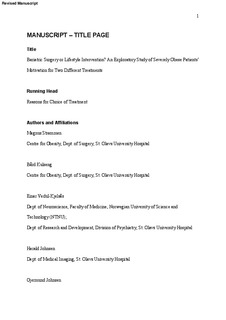| dc.contributor.author | Strommen, M | |
| dc.contributor.author | Kulseng, B | |
| dc.contributor.author | Vedul-Kjelsås, Einar | |
| dc.contributor.author | Johnsen, H | |
| dc.contributor.author | Johnsen, G | |
| dc.contributor.author | Marvik, R | |
| dc.date.accessioned | 2016-05-09T10:15:12Z | |
| dc.date.accessioned | 2016-06-10T12:33:52Z | |
| dc.date.available | 2016-05-09T10:15:12Z | |
| dc.date.available | 2016-06-10T12:33:52Z | |
| dc.date.issued | 2009 | |
| dc.identifier.citation | Obesity Research and Clinical Practice 2009, 3(4):193-201 | nb_NO |
| dc.identifier.issn | 1878-0318 | |
| dc.identifier.uri | http://hdl.handle.net/11250/2392278 | |
| dc.description.abstract | Background:
In the complex field of treating severe obesity, motivation is receiving increased attention. This explorative study aims to highlight what influences the preferences of severely obese patients deciding for either gastric bypass surgery or lifestyle treatment.
Methods:
Patients awaiting laparoscopic gastric bypass were presented with an 18-week inpatient lifestyle programme alternative to gastric bypass. Questionnaires provided qualitative data (reasons for choosing one treatment over another) and quantitative data (mental health assessment using the Hospital Anxiety and Depression Scale). The material was analysed according to a sequential exploratory design involving thematic analysis of patients’ arguments, validation using HADS, and statistical computations (hypothesis testing) with one-way ANOVA followed by Dunnett's post hoc test.
Results:
159 participants (mean BMI 47.2 kg/m2) returned questionnaires of which 32% wanted the lifestyle treatment alternative to surgery. Reasons for choosing the two treatments varied widely as did also the corresponding data on mental health. Two subgroups stood out with particularly high mental symptom scores, namely patients choosing surgery due to reluctance to engage in social interaction in lifestyle treatment, and patients preferring lifestyle treatment due to the fear of dying during general anaesthesia. These two subgroups showed significantly higher symptom scores than other subgroups within their therapy-of-choice group. The number of comorbid diseases was also found to impact upon motivation.
Conclusions:
Patients carry different incentives for choosing the same type of treatment. On a subgroup level, psychopathological symptoms seem to follow motivational patterns. Analysing motivation and mental health may provide measures for identifying subgroups with various prospects for therapy outcome. | nb_NO |
| dc.language.iso | eng | nb_NO |
| dc.publisher | Elsevier | nb_NO |
| dc.relation.uri | http://linkinghub.elsevier.com/retrieve/pii/S1871403X09000386 | |
| dc.subject | Overweight; Obesity; Gastric bypass; Lifestyle intervention; Mental health; Mixed methods research; Sequential exploratory design | nb_NO |
| dc.title | Bariatric surgery or lifestyle intervention? An exploratory study of severely obese patients' motivation for two different treatments | nb_NO |
| dc.type | Journal article | nb_NO |
| dc.type | Peer reviewed | nb_NO |
| dc.date.updated | 2016-05-09T10:15:12Z | |
| dc.source.pagenumber | 193-201 | nb_NO |
| dc.source.volume | 3 | nb_NO |
| dc.source.journal | Obesity Research and Clinical Practice | nb_NO |
| dc.source.issue | 4 | nb_NO |
| dc.identifier.doi | 10.1016/j.orcp.2009.04.004 | |
| dc.identifier.cristin | 341202 | |
| dc.description.localcode | © 2016. This manuscript version is made available under the CC-BY-NC-ND 4.0 license http://creativecommons.org/licenses/by-nc-nd/4.0/ | nb_NO |
